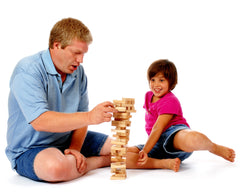
Summer is here and that means learning gets put on pause for two months until the kids go back to school, right?
Nope.
While it may not happen in classrooms, learning is definitely not put on pause throughout the summer. By keeping your kids brains going throughout summer, you’re helping them learn and develop (albeit in far less structured environment).
Here are six expert tips on how to keep your kids learning this summer (without even realizing they’re learning).
Patti Rommel - Director of Research and Development at Lakeshore Learning Materials

1. Set aside one night per week for family game night and choose games that require strategic thinking or that require using reading, writing or math skills.
The classic Jenga is always fun and who doesn’t like seeing all those blocks fall down? Scrabble Jr. and Monopoly Jr. are also recommended, as well as any treasure hunt style games.
2. Our personal favorite of these tips is to provide your children with building materials so they can construct whatever they like. Or, you can challenge them to build specific things.
 Building toys like Click-A-Brick are ideal for this, of course. For older children, you could give them other types of building material like various cardboard boxes, tubes etc. and some tape. Or, if you think they can handle something a little more advanced, you can give them actual building materials like wood and nails.
Building toys like Click-A-Brick are ideal for this, of course. For older children, you could give them other types of building material like various cardboard boxes, tubes etc. and some tape. Or, if you think they can handle something a little more advanced, you can give them actual building materials like wood and nails.
Barbara Dianis - Author of Don't Count Me Out! A Guide to Better Grades & Test Scores PreK-12
3. Barbara suggests setting aside 15 - 30 minutes per day for reading. Take your kids to the public library so they can browse the books and choose the ones that interest them. Reading is more fun for kids when they get to choose what they want to read.
 You can keep track of how much your child is reading throughout the summer on a calendar. Make it more exciting by setting a goal for your children and letting them know if they reach that goal, they can do something really fun and extraordinary like going to the zoo or the water park or some other activity they don’t get to do all the time.
You can keep track of how much your child is reading throughout the summer on a calendar. Make it more exciting by setting a goal for your children and letting them know if they reach that goal, they can do something really fun and extraordinary like going to the zoo or the water park or some other activity they don’t get to do all the time.
Claudia Guerere - Director of Assessment at Project Lead the Way
4. Create a discovery jar at the beginning of summer full of questions your children are curious about. Every day (or at whatever designated interval you choose) pick a question out of the jar to find the answer to.
The questions can be anything that your child can explore and find the answer to. Maybe it’s what kind of plants grow in your yard or how space travel works or how big the dinosaurs were. Whatever gets your child excited!
Dr. Daniel Welsch - Program Director, Natural Sciences at American Public University
5. Turn your pool, lake or ocean outings into simple science experiments. One easy experiment is to see how far sound travels underwater. Ask your kids how far they think it will travel and then have them listen for the sound at various distances. A digital beep from a waterproof watch works well for this.
You can also experiment with how much you float before and after taking a deep breath or asking your kids why they feel more chilled on a breezy day than a calm day and talking about the explanations behind them. (For reference: you will float higher in the water after a deep breath because your lungs are filled with air like a balloon and you feel more chilled on a breezy day because the wind causes the water to evaporate faster off your body and this takes more heat away from you than if it evaporates slowly.)
 6. Geocaching is a fun activity that anyone can do. For the uninitiated, geocaching is like a treasure hunt.
6. Geocaching is a fun activity that anyone can do. For the uninitiated, geocaching is like a treasure hunt.
Go to geocaching.com, or download the app for Android or IOS. These little treasures can be found everywhere.
The app uses the GPS on your phone to guide you to the cache. Once you find it, you leave a trinket, take a trinket, sign the log, and then re-hide the cache for the next geocacher to find. This can lead to discussions with your kids about how GPS works and how it’s able to locate you on Earth using satellites orbiting the planet.
If you think geocaching might be a little bit too much for your younger kids (or they might not be interested in it), you could always try Pokemon Go, which is similar.
Summer isn’t when learning gets put on pause, it’s when kids get to learn the way they want to. Encourage them and make it fun for them.
JOIN THE FUN CLUB



Comments